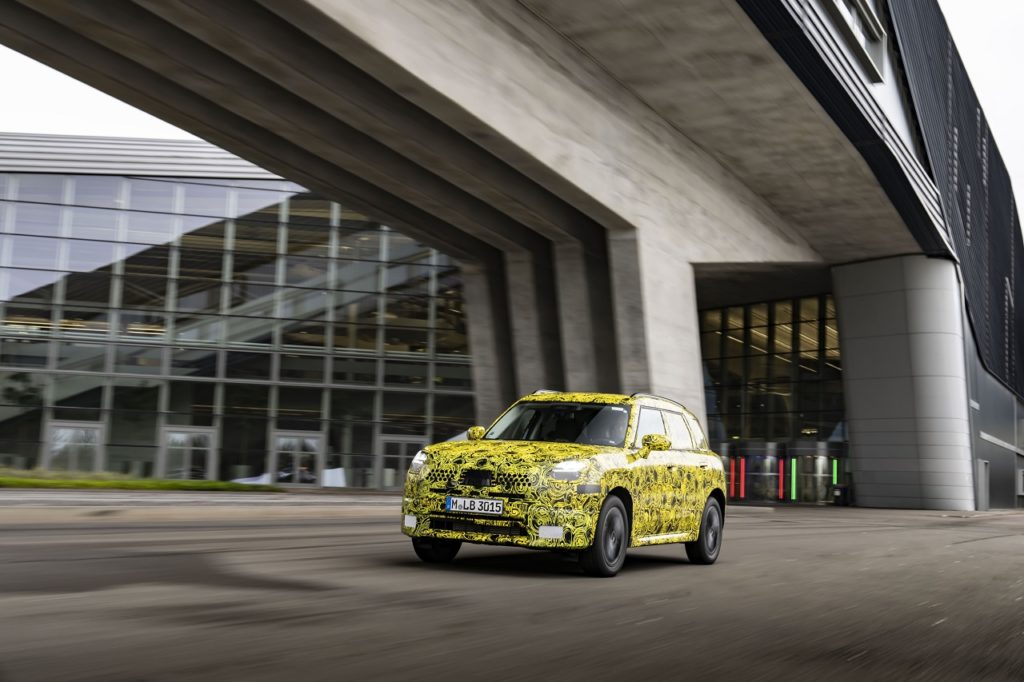The new, fully electric MINI model generation continues to grow: in 2023, production of the new MINI Countryman will begin at the BMW Group plant Leipzig. The crossover model will be offered with both pure electric drive and combustion engines. Preparations for the start of production of the first MINI “Made in Germany” are already in full swing.
Note: This press release is a 1:1 copy of the original issued by BMW headquarters in Germany. No adaptations have been made to cater for the UK market.
Leipzig. MINI’s fully electric future will start in 2023 with, among other things, the new MINI Countryman at the BMW Group plant in Leipzig. This will be the first time that a MINI model is produced entirely in Germany. The locally emission-free all-rounder is an excellent fit for the BMW Group’s sustainable production site in Leipzig, one of the most modern and sustainable automotive factories in the world. As the company’s pilot project for establishing a “green plant,” a long-term, sustainable strategy for energy generation and consumption comes into play here.
“We are delighted to be able to hand over the first MINI “Made in Germany” to our customers in a CO2-neutral manner thanks to the plant’s sustainable energy supply. In this way, the new all-electric MINI Countryman demonstrates what the brand stands for: electrified go-kart feeling and a strong focus on a minimal environmental footprint,” says Stefanie Wurst, Head of MINI.
Petra Peterhaensel as Plant Director and Sonja Hengstler as Project Manager for the new MINI Countryman are responsible in Leipzig for the transformation toward more electromobility and sustainable production of the E-components as well as the entire vehicles. A core workforce of 5,600 employees produces around 1,000 vehicles every day. The new MINI Countryman comes off the production line in Leipzig together with the BMW 1 Series, BMW 2 Series Gran Coupé and BMW 2 Series Active Tourer. This makes the location the first plant at which vehicles of the BMW and MINI brands are manufactured together, once again demonstrating maximum flexibility.
Electromobility as a driver.
The expansion of electromobility is an integral part of the BMW Group’s sustainability strategy. Today, one in five MINI models is already electrified, a testament to MINI fans’ enthusiasm for locally emission-free driving fun. The next major milestone and stimulus for the plant is the production of the new MINI Countryman, which will roll off the production line in Leipzig from the end of this year. The high-voltage batteries for the all-electric MINI Countryman will then come from the plant’s own production facilities.
To this end, the BMW Group is expanding its capacities for e-component production at the Leipzig site by eight production lines by 2024 and investing more than 800 million euros. The future production area of 150,000 square meters on which E-components will be manufactured represents a sustainable investment in the future viability of the Leipzig plant. The expansion is associated with job security and even job growth. By 2024, more than 1,000 employees are to be employed in E-component production.
Long-term commitment to sustainability.
Sustainability is in the genes of the plant Leipzig. Part of the energy required for automotive production can be generated by four wind turbines 190 meters high directly on the Leipzig plant site. In 2021, 21.9 GWh of electricity was generated from wind power. This corresponds to the annual electricity consumption of over 5,000 3-person households. Since 2017, the electricity generated can be temporarily stored in the battery storage farm in up to 700 high-voltage batteries from BMW i3 models.
“Our Leipzig vision is the complete decarbonization of production by replacing fossil fuels with hydrogen. At the BMW Group plant in Leipzig, we are the first automotive plant in the world to use a newly developed burner technology in our paint shop that can use green hydrogen instead of natural gas. Hydrogen has already been used in plant logistics since 2013. Today, five hydrogen filling stations provide energy for over 130 fuel cell-powered industrial trucks, the largest fleet in Germany,” emphasizes Plant Director Petra Peterhaensel.
As the brand’s largest model, the all-electric MINI Countryman leads the new MINI family into an era of locally emission-free electromobility. The transformation to an all-electric brand by 2030 begins with this model generation. Thanks to space-saving components such as the particularly flat high-voltage battery, which is also produced at the BMW Group Plant Leipzig, the MINI Countryman will offer additional space and even greater comfort in the future.
